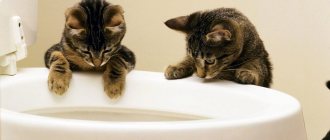A cat has its own place - why does it need it?
Some people enjoy sleeping with their cat, but this isn't for everyone. If you want to have your bed all to yourself, or if your cat prefers to sleep elsewhere, you can make a comfy DIY cat bed or choose from a variety of plush cat beds at your pet store.
Cats love something to sleep on. This could be anything from a folded towel or blanket to a pillow purchased from a pet store. Cat pads are flat pieces of fabric with a small amount of padding.
They are portable and usually washable and suitable for your cat's wanderings; some are electrostatically charged to trap dandruff and hair, and some are made from faux fur or sheepskin to provide extra warmth.
- Cat beds vary in design and price, with options ranging from bowl beds to hammocks and bunk beds.
- The cups are attractive to cats because their round shape follows the natural contour of a curled up cat.
- Some are fleece-lined with a removable, washable cover for added convenience.
- However, your cat may also like to crawl into a wicker lined blanket, laundry basket, or cardboard box.
- Bunk beds, lounge chairs and soft chairs or sofas are also available for your cat, although they are a little bulky and not as portable, they are comfortable and attractive. You can get acquainted with all the options in more detail by looking at the photos of places for cats.
Cat trees are a great way to immerse your pet in nature. Some of these trees also provide a place for your cat to scratch, something she likes to do when she wakes up, and if you have multiple cats, the tree gives more than one cat a place to sleep.
Your indoor kitten can also enjoy the outdoors. They will greatly appreciate your efforts in choosing one of the sunny spots where they can see some activity in the backyard.
However, be careful with open windows, make sure the mosquito nets on the windows are strong and secure, because your cat may kick them out to get outside.
- If you decide to provide your pet with a separate bed, be sure to place it in a comfortable, safe place with an appropriate temperature.
- The cat's place in the apartment should not be near heavy traffic, nor in a cool or damp place.
- Don't choose near the family dog. Do not place near the front or back door.
- Choose in a quiet area where the family gathers, such as the family room or kitchen, or if you prefer, you can keep it in your bedroom.
Some cats are known to lie quite comfortably on top of the refrigerator, where they can watch the family while enjoying the warmth of the engine.
A little educational program
The electromagnetic field is the invisible zone surrounding electrical devices. In fact, it consists of two types of fields - electric and magnetic. An electric field is a special form of matter that exists around bodies or particles that have an electric charge. It is created by voltage due to the strength of the current that passes through the wires. Most electric fields can be neutralized by the design of the device itself or by some kind of barriers, such as walls. The magnetic field is also a component of the electromagnetic field. It appears in the presence of a time-varying electric field. In addition, a magnetic field can be created by a current of charged particles. Magnetic fields are the main cause of our health problems. They can penetrate long distances and through most barriers and are difficult to shield. The BioInitiative Report, published a couple of years ago by an international group of scientists and physicians, documented the serious problems associated with our exposure to power lines, cell phones, and many other sources of radio frequencies and electromagnetic fields. The Report concludes that current safety standards are completely inadequate and do not protect our health. Research has proven that electromagnetic fields can damage DNA, disrupt protein synthesis, reduce immunity, and cause cancer even in childhood...
Room neighbours
There is no need to make excuses if you allow your cat to sleep in her favorite place - your bed. Pets love to cuddle in a cozy bed with their best friend, and often the feeling is mutual.
Proponents of this method say it strengthens the bond between human and cat, not to mention the comfort and warmth that a warm, purring sleep companion can provide. This is an adult version of a teddy bear.
But before you bless this seemingly innocent habit, consider the following:
- Cats rarely sleep through the night and often wake up too early for most people, usually around 4-5 am. At this point they want to be fed and they may also want to play.
- Cats are fascinated by anything that moves, and if the nearest thing is your hand or foot, you may experience a traumatic awakening.
- Even though cats are known to be picky about cleanliness, they do use the litter box.
You may have allergies and may need to spend time away from your kitten, especially while sleeping. However, most behavioral problems can be managed, and training is always worth the effort.
Your cat may learn to be quiet when she wakes up, or she may leave the room on her own. A few times a firm “no” can stop the kicking game. And you can help her keep her paws clean if that's a problem, or cover your antique blanket with a towel or blanket.
Where in the house do cats usually sleep?
Having figured out where and why cats like to sleep, let’s move on to what exactly a cat’s corner should look like. In addition to the most attractive locations, it is recommended to pay attention to those that may be dangerous.
What places need to be better equipped?
Based on your pet's preferences. Observe where he rests most often and do everything possible for comfort and safety.
If your cat loves heights, give him a separate space on a closet or windowsill, adding a soft blanket or bed from the store. If he gravitates more towards secluded locations such as a laundry basket, replace it with a comfortable cup-shaped bed from a pet store. Also suitable in this situation is a wicker basket or cardboard box, which you can decorate as you wish. The main thing is that the inside is warm, dry and clean - periodically any bed needs to be cleaned and washed with odorless products.
Where is it better to keep your pet out?
Despite the cat's dissatisfaction, it is recommended to leave some places off-limits. These include:
- baby's cradle;
- allergy room;
- kitchen set and dining table;
- cornice in the absence of a protective mesh “anti-cat”;
- a rug in the hallway containing a large amount of dirt and germs;
- washing machine;
- a system unit that is often damaged as a result of overheating from cat hair.
All of the above poses a danger to the health of the animal itself and its owners, as well as their property. Stop sleeping in restricted areas from the first days of your pet's arrival. Special repellent sprays, citrus peels, rustling foil and tape are suitable for this.
How to choose a place for a cat bed
Cozy corner. The best way to place a cat is to place her crib in an area that she has already designated as her favorite place to sleep.
Whether on the sofa, under the bed or on the windowsill, your cat will likely continue to sleep wherever she sees fit, even if there is a cozy bed for her somewhere else.
Pay attention to your cat's favorite places to nap and try setting up cat beds there first.
If she's hesitant to curl up in her new bed, try putting cat treats or sprinkling catnip in it to entice her.
What does Murka have to do with it?
Cats, ants and termites have an unusual feature: they are all attracted to geopathogenic zones. Natural radiation that rises from the depths of the Earth can be distorted by weak electromagnetic fields created by underground running water, the concentration of certain minerals, fault lines in the earth's crust, and underground voids. Pathogenic energy is also created by modern technology - telecommunication towers, power lines, transformers, radars and radio towers. Potential health problems that may arise due to geopathogenic environmental influences include: cardiovascular and neurological disorders, immunodeficiency, chronic fatigue and irritability, headaches, learning difficulties, signs of premature physical aging, infertility, miscarriages, restless sleep. Sleeping in geopathogenic places is especially harmful, since during sleep the brain should rest only half the time, and the other half it is busy “repairing” our body. However, if we are exposed to pathogenic energies during sleep, the brain cannot ensure tissue regeneration. “But what does the cat have to do with it?” - you ask. The fact is that usually your pet likes to sleep in the most pathogenic place. She is drawn there, like a stalker created by the imagination of the Strugatsky brothers. If you don’t have a cat, take a closer look at where indoor plants wither and don’t bloom - there’s probably a geopathogenic zone there. You can also use a geomagnetometer to measure the magnetic fields in your home, and this is worth doing, especially if you suffer from any of the geopathic stress symptoms mentioned above.
Favorite furniture
Have you ever noticed that your cat's favorite place to sleep is wherever you are?
- Whether you're watching TV on the couch or sleeping in bed at night, your indoor cat is sure to snooze next to, if not right on top of, you.
- This is because cats are social creatures who enjoy being around you.
- Give your cat a bed on the arm of the sofa or next to your bed so she can curl up comfortably next to you as you relax.
Season
Cats change their usual sleeping place every couple of months. One reason is the weather. In winter, pets like to lean against something warm, such as a radiator or heater, while in summer you will almost certainly find them sleeping on a cool tiled floor. Another favorite place for some cats in the summer is the bathroom or shower. If you notice this habit in your pet, always check that it is in the bathroom before turning on the water. Why do cats like to sleep on a hill in winter? It's simple: hot air is lighter than cold air and rises.
Where it's quiet
Cats love to be close to you when you sit or sleep, but if the house is busy and noisy, your kitten will likely want to sleep in a quiet and private place.
Bedrooms are a great place to place your cat's bed to sleep during the day because bedrooms typically don't get as much daytime use as other parts of your home. Even a quiet corner in the kitchen or home office can offer your kitty privacy for an afternoon cat nap.
Your own tuning fork
Our body is able to repair itself while it sleeps. To do this, it has its own internal system, which operates on the basis of very weak electrical impulses. These impulses are produced by the brain and are used to communicate between cells. After all, what is our body? Basically - water with a high content of minerals, that is, an electrically conductive environment. The cells of the brain, bones, nerves - all vibrate at their own frequencies, and our body acts as a tuning fork tuning them to the desired frequency. This phenomenon has a scientific name - resonance. But if other, foreign vibrations (an external electric field) arise nearby, the body's cells will be confused about what they should do and how quickly. And in the place where we sleep, the impact of external sources (electrical wiring in ceilings, walls and floors) on the body becomes thousands of times stronger than the effect of the electrical system of our own body. Long-term exposure to these electric fields can disrupt the ability of our body's cells to communicate within themselves. In fact, a person spends approximately one third of his life sleeping, which is why it is important for us to make sure that our bedroom is protected from electromagnetic field disturbances.
Furniture for cats
Most cat owners buy cat furniture for their pets along with cat beds. Cat-friendly furniture can even make the perfect place for a cat's bed.
Many cats like to sleep on top of or inside a cat condo or on flat perches in a cat tree. Make your kitty's cat furniture even cozier with a bed.
Hints
Remember that cell phones and wireless Internet are not the only energy sources you need to be careful with. Essentially, almost all technology creates electromagnetic fields, including the wiring in your home, electric alarm clocks, electric heating pads and many other appliances and devices. Unplug all electrical appliances at night. In the bedroom, turn off everything electrical, including your cell phone, and never place it at the head of the room. Avoid using a cell phone in a car when there is a child or pregnant woman in the car. Let there be no metal in your sleeping place. Try moving the bed to one side or the other, or even move it to the opposite wall to see if you feel different. At a minimum, position your bed so that your head is at least one to two meters away from all electrical outlets. If you are building or renovating a home, use the walls to install a protective reflective barrier made of thick aluminum foil, which is also very effective at shielding electromagnetic fields. In a word, take a little care of your body, and it will thank you. And here I am writing all this and sighing. I have two cats; I don’t sleep where they sleep, they sleep where I am: on a chair, on a couch, on my bed, on the floor at my feet, on my lap. I believe that for them I am a geopathogenic zone! Whether they sleep next to me or right on top of me, we all wake up wonderfully rested. Apparently, cats absorb everything harmful, so there is nothing left for the ants - they are not in the house! And my indoor flowers grow well.
Magazine: Secrets of the 20th century No. 37, September 2009 Category: Let's talk about health Author: Yana Kirichenko
Tags: Secrets of the 20th century, cat, house, housing, protection, sleep, animals, radiation, ecology, geopathogenic zone, smog
- Back
- Forward
slight hill
Many cats feel comfortable at a height where they can see the entire room from their perch. This is why you will often find cats on the arms of sofas or even on the tops of bookcases.
- When choosing a place to put your bed, consider placing it on furniture rather than on the floor.
- Window sills allow cats to explore your home and backyard, and a heated cat bed can make a cold windowsill cozy for kitty in the winter.
- The back of the sofa is soft, comfortable and high enough to make your kitty feel safe.
Instincts
In the wild, felines must remain vigilant and wary of other predators. Their domesticated counterparts adopted a strong instinct for self-preservation. Sleeping in unusual places is one way of protection. By the way, this same instinct makes a cat carry her newborn kittens around the house in search of the safest place, in her opinion. The habit of dozing on cabinets and high shelves can also be explained by the desire for complete protection. Looking down on everything, the cat maintains control over the situation and can not only protect itself, but also attack the victim.
Photo of the best place for a cat
What affects how long a cat sleeps?
The duration and quality of an animal's sleep depend on a number of reasons:
- Age. Young kittens and adults sleep more than middle-aged kittens.
- Breed. Representatives of the Scottish and British breeds especially like to nap. They usually go to rest immediately after eating. Abyssinians, due to their high activity, have less need for this.
- Health and stress. Sick animals sleep less than healthy ones, and their sleep is also more sensitive.
- The situation in the housing. There may be sleep disturbances if the animal experiences discomfort or if one of the family members disturbs it.
If the pet is absolutely healthy and does not experience fear or fear of anything, it will sleep at least 12 hours a day. To create more comfort for him, you should purchase a special house in which he can retire from prying eyes.
After sterilization, a cat sleeps more than before. This occurs due to hormonal fluctuations. The production of certain substances that affect activity decreases or stops altogether, which often leads to excess weight gain and increased drowsiness.
Why do domestic cats sleep more than indoor cats?
Domestic cats sleep more than stray cats because they do not need to search for food. A barn cat may not receive food for several days in a row; in this state, it will direct all its efforts to solving problems with hunger.
Backyard animals are more susceptible to stress associated with the influence of the outside world. Sleeping undisturbed for a long time can be simply dangerous to life and health.
How cat breed affects sleep duration
Belonging to the breed determines the behavior, character and duration of sleep. This is due to the characteristics of the cat’s nervous system and temperament. Easily excitable breeds, such as Asians, Siamese, and Orientals, sleep less than average.
Cats with a phlegmatic temperament - Persians, Coons, and Scots - sleep more than average. The duration of sleep determines primarily the health status of the pet. the owner must monitor the behavior of his animal and pay attention to any deviations. There may be deviations if the animal has problems with its health.
If the cat suddenly becomes lethargic, sleeps a lot, refuses to eat, does not pet or play, problems with his health should be ruled out. It is worth seeking help from a veterinarian.











